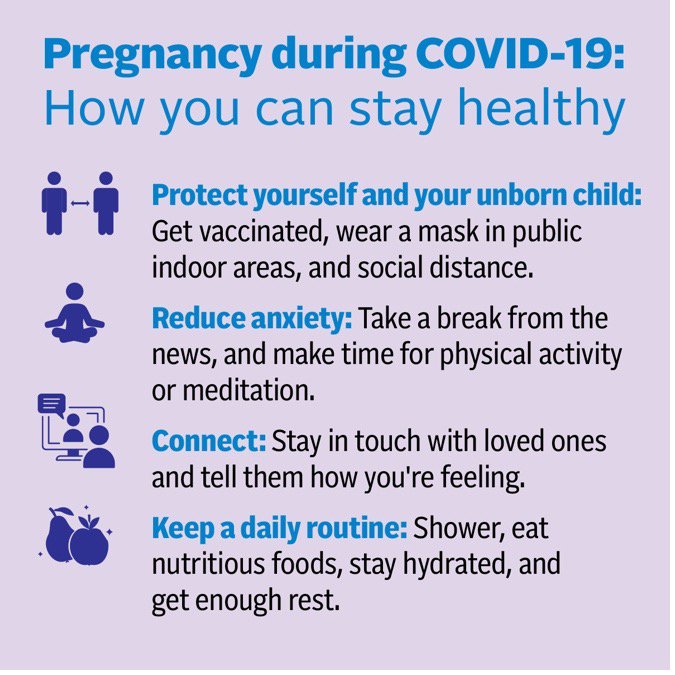
February 09, 2022
Childbirth is a complex, life-changing event on its own, and the COVID-19 pandemic has created even more challenges during each stage of pregnancy for expecting and new parents. If you're in this situation, here’s what you can do:
YES! The CDC reassures us that the COVID-19 vaccine is safe during pregnancy and for those who are breastfeeding. It is also safe for people who are trying to get pregnant or may become pregnant in the future.
Not only is the COVID-19 vaccine safe for pregnant people, but it’s an important way to keep mom healthy. We now know that those who are pregnant or were recently pregnant are at a higher risk for severe illness from COVID-19. This includes having a higher risk for preterm birth, hospitalization, and death.
There is another potential benefit of getting vaccinated while pregnant — protecting your baby! Studies show that vaccinated moms transfer antibodies to their baby through the placenta and breast milk. Since infants and very young children are not yet eligible for the COVID-19 vaccine, this could help protect them against COVID-19.

The bottom line: Pregnant people have a higher chance of having a bad outcome if they become infected with the COVID-19 virus than they do from getting the COVID-19 vaccine. Improve your chances of staying healthy (and keeping your baby healthy) by getting vaccinated.
Pandemic or not, deciding on a birth plan has always been a part of pregnancy planning. Now, with COVID-19 in the picture, it’s more important than ever to consider exposure risk and comfort level when creating a birth plan.
Whether you will deliver in the hospital or a birthing center, figuring out where to deliver is a unique and individual decision best made after an open discussion with your obstetrician or midwife. They can help you determine an appropriate setting, where the anticipated needs of both you and your baby can be met. In addition, you should ask about COVID-19 policies in place to see whether that impacts who will be with you during delivery or afterwards.
Independence Blue Cross (Independence) members can enroll in the Baby BluePrints® program for individualized support throughout pregnancy and after giving birth. Registered Nurse Health Coaches can also help with pregnancy safety and the pandemic and provide helpful resources. Members who are expecting can call 1-800-598-BABY to enroll.
Your birth plan isn’t the only thing that needs to be carefully considered. You’ll also need to decide on your approach for what will happen when you bring baby home. It’s important to protect babies from illness, especially in the first months of life, but COVID-19 presents additional things to consider.
Be sure to communicate your plan clearly to your family and loved ones so there aren’t any surprises once your baby arrives.
Here are some guidelines to consider:
Of course, anyone who is around the baby should wash their hands frequently (or use hand sanitizer when soap and water aren’t available).
Take advantage of free resources and talk to your doctor to plan for your baby’s arrival.
Let’s be honest: Even in the best of circumstances, navigating the first few weeks and months after a baby is born is a serious undertaking! It can be helpful to keep a daily routine, including showering, eating nutritiously, staying hydrated, and getting as much rest as possible.
In addition to caring for the baby, a new mother may be dealing with anxiety, mood changes, exhaustion, discomfort, and changes in appearance. It’s completely normal to feel overwhelmed by all these changes — and with the stress of the ongoing COVID-19 pandemic, these feelings are likely exacerbated.
Here’s a great resource that explains the signs of postpartum depression and anxiety: Action Plan for Depression and Anxiety During Pregnancy and After Birth. Don’t be afraid to ask for help (or to recommend help, if you are worried about a loved one). There are also numerous free in-person or virtual parenting support groups in Greater Philadelphia.
While it is important to practice social distancing to keep baby safe from COVID-19, I encourage new mothers not to isolate themselves. Staying in touch with loved ones — even virtually — can help moms feel supported. Phone calls and video chatting are easy ways to check in, receive help, and stay connected.
It’s critical to make and keep all recommended doctor’s appointments for a newborn. Pediatricians use these appointments to ensure that your baby is growing properly and to look for any developmental issues.
Did you know that Independence members who deliver in a hospital can receive home care visits during the days following delivery through the Mother’s Option benefit? These visits are designed to check in on the health and progress of both mom and baby. Talk to the hospital discharge planner or your baby’s pediatrician to set up an appointment with an approved Mother’s Option home care provider.
Lactation counseling is another covered benefit for members. Members can find a list of in-network lactation consultants using the Find a Doctor tool. In addition, Independence Health Coaches can provide initial breastfeeding support and connect members to health-related resources and information. To reach a Health Coach, members can call 1-800-ASK-BLUE or send an email by logging in at ibx.com and selecting Email a Health Coach in the Health and Well-being menu.
This article was originally published on IBX Insights.
Dr. Dolores Roman joined Independence Blue Cross in 2019. As a 20-year veteran of emergency rooms in and around the Philadelphia area, Dr. Roman has dealt with every kind of emergency. Now as a medical director at Independence, Dr. Roman is involved in utilization management, case management, and quality improvement. What Dr. Roman loves most about this job is the opportunity to collaborate with colleagues in order to enhance the health and well-being of those served by Independence Blue Cross.